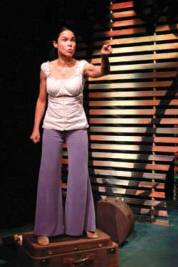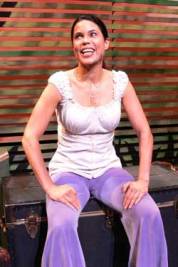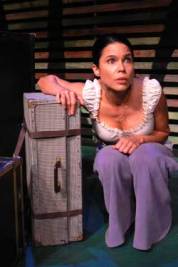
Check the local theater listings and it seems at times that every performer has an autobiographical solo show up his or her sleeve. Few solo shows, however, ever achieve the success of Debra Ehrhardt’s Jamaica, Farewell, with Rita Wilson (aka Mrs. Tom Hanks) as its above-the-title producer and Joel Zwick, the director of My Big Fat Greek Wedding and every single Hershey Felder one-man-show, at its helm.
Jamaica-to-America transplant Ehrhardt could hardly have expected her ninety-minute solo show to end up programmed by one of L.A.’s most popular Equity houses when she began performing it several years ago at various smaller venues, but Hanks and Wilson caught Jamaica, Farewell one evening and loved it, Wilson signing on as power producer, a title well earned given her previous film collaboration with Zwick. (My Big Fat Greek Wedding has been called “the most profitable movie of all time.”)
The result of all this serendipity is that Jamaica, Farewell has hit the big-time big—as the final production of the 2010-11 season at the Falcon Theatre, one which has gained Ehrhardt an even greater number of fans.
We first meet “Debbie” as a precocious mixed-race child growing up in Jamaica, the Latina-looking tot having ample reason to dream of a move to America, a country whose citizens are (she tells us in her Jamaica-accented little girl voice) called “Doodle Dandies.” With an alcoholic father and a mother who finds ways to rationalize her husband’s misdeeds (e.g. when his gambling debts mean once again selling the furniture, Mom states simply that this makes it ”easier to vacuum the corners”), Debbie grows up in a self-created fantasy world where “if you dream it, you can achieve it.”
Efforts at getting an exit visa prove futile, however, even after being admitted to the University of Florida’s nursing program, and even when posing as what ought to be a shoo-in for permission to travel abroad—an unfortunately not quite convincing enough Catholic nun. Debbie’s prospects grow even grimmer when socialist leader Michael Manley comes to power, his ties with the Soviet Union and Cuba causing the U.S. to ban all travel to and from Jamaica.
Debbie’s luck begins to change when she meets and begins dating CIA operative Jack Wallingsford, and later in the guise of a smuggling scheme devised by her boss, who recruits Debbie to smuggle a million dollars from Jamaica to the U.S., reasoning that who better to entrust with this mission than the traveling companion of someone as above-suspicion as Wallingsford?
The road to America proves fraught with peril, giving actress Ehrhardt the chance to strut her dramatic stuff as skillfully as she performs earlier, more comedic scenes. Ehrhardt not only plays herself at various ages but assumes the guises of the many supporting characters in her life: her religious mother, her boozy dad, a childhood friend named Charmaine, a hard-hearted visa officer, a fire-and-brimstone preacher, a bootilicious madam, and a Chinese gangster named “Bullet.” Ehrhardt also proves herself an expert at the well-timed quip, as when she wisecracks “My dad’s out with his friends again: Jim Beam, Jack Daniels, and Captain Morgan,” or describes her dashing CIA beau as “like Double-O-Seven, or at least Double-O-Six or Double-O-Five.”
The delightful Ehrhardt holds the audience in palm of her hand from the show’s opening scenes to the its just-right coda, which has the now-American Debra bringing us up to date on her life since coming to the U.S. twenty years ago. At the performance reviewed here, she was joined for the finale by her hunky, supermodel-handsome son Danny, who led the audience in a chorus of “Day-O (The Banana Boat Song).”
Jamaica, Farewell’s latest incaration at the Falcon ought to be required viewing for anyone wanting a “how to” course in directing a solo show. The ingenious Zwick is aided and abetted in his endeavors by lighting designer extraordinaire J. Kent Inasy and by François-Pierre Couture’s cleverly designed tropical set, one which Inasy’s lighting transforms from locale to locale as it sets and accentuates the play’s many moods, from light and playful to dark and suspenseful. Jon Gottlieb’s sound design is a stellar one as well, whether setting the mood through music, or punctuating Debbie’s bad luck at getting a visa with a loud rejection stamp, or surrounding the audience with brothel-goers’ ecstatic moans and cries. The single costume Cate Adair has designed for Ehrhardt transforms into various guises via an oh-so versatile scarf. Sue Karutz is stage manager.
Next up for Jamaica, Farewell is (what else?) a film adaptation, Wilson having optioned the piece for the big screen. In the meantime, a single performer on a not-so-big stage is taking audiences on her very personal journey to resounding cheers and unanimous raves. Who needs a cast of thousands when you’re Debra Ehrhardt?
Falcon Theatre, 4252 Riverside Drive, Burbank.
www.falcontheatre.com
–Steven Stanley
April 6, 2011
Photos: Chelsea Sutton





 Since 2007, Steven Stanley's StageSceneLA.com has spotlighted the best in Southern California theater via reviews, interviews, and its annual StageSceneLA Scenies.
Since 2007, Steven Stanley's StageSceneLA.com has spotlighted the best in Southern California theater via reviews, interviews, and its annual StageSceneLA Scenies.







 COPYRIGHT 2024 STEVEN STANLEY :: DESIGN BY
COPYRIGHT 2024 STEVEN STANLEY :: DESIGN BY